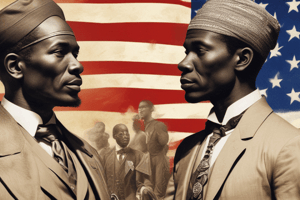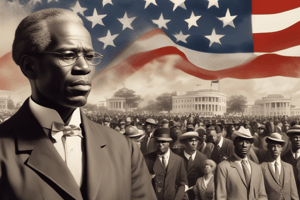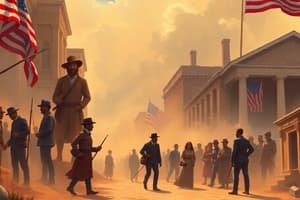Podcast
Questions and Answers
What was the main goal of the Radical Republicans during Reconstruction?
What was the main goal of the Radical Republicans during Reconstruction?
- To limit federal power in the states
- To ensure civil rights for freed slaves and rebuild the South (correct)
- To promote a laissez-faire economic policy
- To reintegrate Southern states quickly into the Union
What was the outcome of the Compromise of 1877?
What was the outcome of the Compromise of 1877?
- Federal troops were withdrawn from the South (correct)
- The South gained full representation in Congress
- Reconstruction policies were extended for another decade
- It resulted in immediate civil rights legislation
What were the Black Codes?
What were the Black Codes?
- Federal mandates for education in the South
- Regulations on African American employment and rights (correct)
- Laws aimed at integrating freed slaves into society
- Policies encouraging African American migration to the North
What was the purpose of the Freedmen's Bureau?
What was the purpose of the Freedmen's Bureau?
What did the 19th Amendment accomplish?
What did the 19th Amendment accomplish?
How did the Treaty of Versailles contribute to WWII?
How did the Treaty of Versailles contribute to WWII?
Why was it challenging to enforce the 18th Amendment?
Why was it challenging to enforce the 18th Amendment?
What was one effect of Prohibition?
What was one effect of Prohibition?
Flashcards
Lincoln's Reconstruction Plan
Lincoln's Reconstruction Plan
Lincoln's plan for Reconstruction focused on a quick return to the Union, aiming to pardon most Confederates and allow states to rejoin with minimal conditions. He favored leniency and limited punishment, emphasizing a speedy restoration of normalcy.
Radical Republican Reconstruction
Radical Republican Reconstruction
Radical Republicans, a faction within the Republican Party, demanded harsher treatment of the South and greater rights for freedmen. They pushed for land redistribution, voting rights for Black Americans, and harsher penalties for Confederate leaders.
Ten Percent Plan
Ten Percent Plan
The Ten Percent Plan was Lincoln's initial proposal for Reconstruction. It stated that a state could rejoin the Union if ten percent of its voters from the 1860 election pledged loyalty to the Union and abolished slavery.
Impeachment of Andrew Johnson
Impeachment of Andrew Johnson
Signup and view all the flashcards
Success of Reconstruction
Success of Reconstruction
Signup and view all the flashcards
The Compromise of 1877
The Compromise of 1877
Signup and view all the flashcards
Hayes & Reconstruction's End
Hayes & Reconstruction's End
Signup and view all the flashcards
African Americans and the Republican Party
African Americans and the Republican Party
Signup and view all the flashcards
Study Notes
Reconstruction Era
- Lincoln's goal for Reconstruction focused on quickly reintegrating the South into the Union.
- Radical Republicans wanted a more punitive approach, aiming for significant social and political change in the South.
- The Ten Percent Plan proposed that a Southern state could rejoin the Union once 10% of its voters pledged loyalty to the Union.
- Andrew Johnson's impeachment stemmed from his opposition to Radical Republican policies. The impeachment trial sought to remove him from office.
- Reconstruction successes included establishing African American voting rights, and a significant growth in participation by Freedmen.
- The Compromise of 1877 resulted from disputed presidential election outcome, ending Reconstruction efforts and effectively withdrawing federal troops from the South.
- Hayes ended Reconstruction by removing federal troops from Southern states.
- Following the 15th Amendment, many African Americans joined the Republican party.
- The Ku Klux Klan (KKK) used violence and intimidation to suppress African American rights.
- Black Codes were discriminatory laws aimed at limiting the rights of African Americans.
- Redeemers were Southern Democrats who regained political power and sought to restore the pre-Civil War social order.
- Sharecropping was a system where formerly enslaved people worked land owned by others and paid rent with a share of their crops.
- Enforcement Acts were laws designed to combat violence and discrimination against African Americans.
- The Freedmen's Bureau assisted newly freed slaves.
Other Topics
- Carpetbaggers: Northerners who moved South during Reconstruction to gain economic and political advantages.
- Compromise of 1877: A political agreement that effectively ended Reconstruction by withdrawing federal troops from the South.
- Booker T. Washington's views focused on economic self-sufficiency for African Americans through vocational education.
- The transcontinental railroad's economic benefits facilitated westward expansion and trade.
- Labor unions were formed to improve working conditions and wages.
- Robber barons were wealthy industrialists who amassed fortunes often through questionable or unethical business practices.
- Monopoly: control over an industry.
- Gospel of Wealth: An essay written by Andrew Carnegie advocating philanthropy among the wealthy.
- Social Darwinism: A theory that applied the idea of "survival of the fittest" to social and economic issues.
- Manifest Destiny: The belief that the US was destined to expand across North America.
- The Open Door Policy: A US foreign policy in which the US proposed that all nations should have equal access to trade with China.
- Anti-Imperialists opposed US expansionist policies.
- Roosevelt Corollary: An extension of the Monroe Doctrine asserting the right of the U.S. to intervene in Latin American affairs.
- Treaty of Versailles: ended World War I, but its terms contributed to the conditions of World War II.
- Fourteen Points: Woodrow Wilson's plan for peace after World War I, aiming for self-determination and international cooperation.
- Harding's administration: an era known for corruption and scandal.
- Henry Ford's impact: assembly line production techniques transformed manufacturing.
- 19th Amendment: Granted women the right to vote.
- Palmer Raids: Federal raids on suspected radicals and communists.
- 18th Amendment: Prohibition (banning of alcohol).
- Prohibition's side-effects: increased organized crime and illegal activities.
- Red Scare: Period of intense fear of communism and radicalism.
- Native Americans and the government (1924): Continued governmental suppression and disenfranchisement, continuing difficulties.
- Sacco and Vanzetti: Two Italian immigrants convicted of murder.
- Roaring Twenties: A period of economic prosperity and social change.
Studying That Suits You
Use AI to generate personalized quizzes and flashcards to suit your learning preferences.




